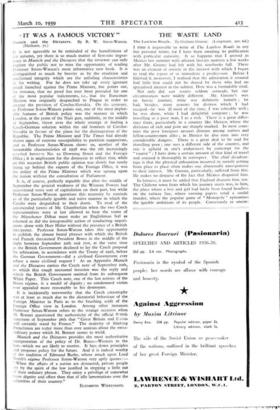IT WAS A FAMOUS VICTORY"
munich and the Dictators. By R. W. Seton-Watson. (Methuen. 5s.)
Jr is not agreeable to be reminded of the humiliations of last autumn, yet there is so much matter of first-rate impor- tance in Munich and the Dictators that the reviewer can only implore the public not to miss the opportunity of reading l'rofessor Seton-Watson's most informative new book. It is distinguished as much by brevity as by the erudition and intellectual integrity which are the unfailing characteristics of his writing. For he does not take up every ignorant attack launched against the Prime Minister, but points out, for instance, that no proof has ever been provided for one of the most popular indictments, i.e., that the Runciman Mission was originally despatched to Prague in order to arrange the partition of Czecho-Slovakia. On the contrary, as Professor Seton-Watson points out, one of the most deplor- able features of British policy was the manner in which London, at the point of the Nazi gun, suddenly, in the middle of September, threw over the whole attempt at finding a Czech-German solution within the old frontiers of Czecho- S!ovalcia in favour of the plans for the disintegration of the Republic. The Prime Minister and The Times had already shown signs of extreme susceptibility to partition suggestions, and as Professor Seton-Watson shows us, another of the lamentable characteristics of 1938 was the rift increasingly revealed betwe-m No. so Downing Street and the Foreign Office ; it is unpleasant for the democrat to reflect that, while on this occasion British public opinion was slowly but surely lining up behind the experts of the Foreign Office, it was the policy of the Prime Minister which was sprung upon the nation without the consultation of Parliament.
It is, of course, perfectly arguable that after the middle of September the general weakness of the Western Powers had necessitated some sort of capitulation on their part, but while Professor Seton-Watson questions this necessity he reminds us of the particularly ignoble and naïve manner in which the Czechs were despatched to their doom. To read of the unconcealed yawns of Mr. Chamberlain when the two Czech representatives were at last allowed to hear the terms of the Miinchener Diktat must make an Englishman feel as ashamed as did the irresponsible action of conducting negoti- ations alone with Herr Hitler without the presence of a British interpreter. Professor Seton-Watson takes this opportunity to publish the almost brutal phrases with which the British and French threatened President Benes in the middle of the night between September 20th and 21st, at the same time as the British Government declined to lay the Czech proposal for arbitration, in accordance with the Treaty of 5926, before the German Government—did a civilised Government ever refuse a more civilised request ? As an Appendix Munich and the Dictators carries the Czech note of September zoth, to which this rough nocturnal invasion was the reply and which the British Government omitted from its subsequent White Paper. This Czech note, one of the last actions of the Benes regime, is a model of dignity ; no condemned victim ever appealed more reasonably to his destroyers.
It is incidentally noteworthy that the Czech catastrophe was at least as much due to the dictatorial behaviour of the Foreign Minister in Paris as to the brushing aside of the Foreign Office view in London. Among other instances Professor Seton-Watson refers to the strange occasion when M. Bonnet questioned the authenticity of the official Bitish statement of September 26th that "Great Britain and Russia will certainly stand by France." The majority of thinking Frenchmen are today more than ever anxious about the extra- ordinary power which M. Bonnet seems to wield.
Munich and the Dictators provides the most authoritative Interpretation of the policy of Dr. Benes—Western to the last—which we are likely to receive. It lays down principles and proposes policy for the future. And it is indeed worthy of the tradition of Edmund Burke, whose attack upon Lord North's regime Professor Seton-Watson very aptly quotes:— When the affairs of a nation are distracted, private people are by the spirit of the law justified in stepping a little out f their ordinary phrase. They enjoy a privilege of somewhat more dignity and effect than that of idle lamentations over the calamities of their country."
ELIZABETH WISKEMANN.










































 Previous page
Previous page